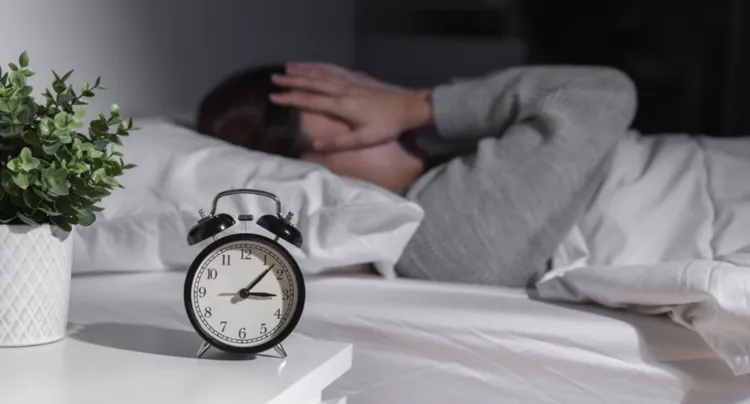What happens when your second brain is out of balance and sleep is affected?

Title: What happens when your second brain is out of balance and sleep is affected? Introduction: Research links gut bacteria imbalance to insomnia, suggesting healthier gut may improve sleep quality and treat insomnia. Keywords: ['Mental health', 'Biological Sciences'] Author: Shao Wenya, Associate Professor at Fujian Medical University. Reviewer: Liu Chang, Professor at Shenzhen University of Science and Technology.
Have you ever had a night like this, tossing and turning until two in the morning, your mind stuck on replay, going over the trivialities of the day again and again? You might think it's due to too much stress, overindulging in coffee, or spending too much time on your phone, but in reality, such issues might be rooted in your gut. Gut bacteria can also cause you to lose sleep. In recent years, the gut-brain axis has increasingly attracted the attention of researchers as a remarkable physiological pathway. The digestive tract is home to approximately 500 million neurons—equivalent to the total number of neurons in a cat's brain—allowing it to independently regulate gut functions such as peristalsis, secretion, and absorption without the involvement of the central nervous system. Moreover, it hosts trillions of microorganisms that not only aid in digestion and vitamin synthesis but also influence various physiological functions. Referring to these microorganisms as the 'second brain' is not an exaggeration.
The human gut is a complex ecosystem that hosts approximately 3.8 × 10¹³ (about 38 trillion) microbial individuals, the majority of which are bacteria. Together, they form a vast gut microbiome. These bacteria are not merely silent workers breaking down food; they also communicate with the central nervous system through the 'gut-brain axis,' influencing emotions, stress responses, and even sleep rhythms. The gut-brain dialogue mainly relies on three mechanisms: chemical signals, neural signals, and immune signals.
First, some bacteria secrete short-chain fatty acids, such as butyrate, propionate, and acetate. These molecules act on receptors in brain cells (such as FFAR2 and FFAR3), regulating learning, memory, and sleep. Second, certain bacteria can also metabolize tryptophan, influencing the production of neurotransmitters serotonin and melatonin—both of which are crucial for the body's sleep process. Finally, the gut microbiota can interact with the immune system, indirectly affecting inflammation responses in the brain and neuronal activity.
Research conducted by Nanjing Medical University and George Mason University has further revealed which bacteria play a key role in the drama of insomnia. They analyzed genetic data from over 400,000 individuals along with characteristics of gut microbiota, identifying 22 bacterial lineages associated with insomnia. Among these, 14 types of bacteria were found to increase the risk of insomnia, such as the Clostridium innocuum group, Prevotella 7, Lachnoclostridium, and Paraprevotella, while 8 types appear to have a protective effect, including Coprococcus 1, Lactococcus, and Actinomycetaceae.
The research team found that the genus with the highest risk is the Clostridium innocuum group. This bacterium itself is not pathogenic, but it affects the body's tryptophan metabolism pathway. Tryptophan is the raw material for synthesizing serotonin, which is a precursor to melatonin—melatonin helps us sleep. If certain bacteria excessively consume tryptophan or disrupt this metabolic chain, it may lead to a lack of sleep signals in the brain.
On the other hand, beneficial bacteria such as Coprococcus 1 can produce short-chain fatty acids like propionate, which help maintain the gut barrier and balance neural signals, thereby contributing to emotional stability and sleep rhythms. In other words, certain bacteria may act like hypnotists, putting the body into a state of tranquility, while others may serve as disruptors, causing heightened alertness and difficulty in falling asleep.
Surprisingly, scientists have found that the relationship between the gut and sleep is not one-sided. Insomnia itself can also alter the gut microbiota, trapping the body in a vicious cycle of worsening sleep. In this study, the research team discovered through reverse causal analysis that long-term insomnia can lead to changes in the abundance of up to 19 types of gut bacteria. Among these, some bacteria, such as Odoribacter and Holdemania filiformis, showed a significant increase in numbers, while beneficial bacteria like Sutterella, Lachnospiraceae UCG-001, and Streptococcus thermophilus experienced a marked decrease. These changes suggest that insomnia not only leaves individuals mentally exhausted but also silently reshapes the gut ecology.
Scientists believe that insomnia leads to an imbalance in the gut microbiota (brain-gut dialogue) for three main reasons: Firstly, the effect of pressure. Long-term poor sleep can lead to the brain secreting stress hormones (such as cortisol and norepinephrine), which affect intestinal neural activity through the 'brain-gut axis,' resulting in changes to the structure of the gut microbiota. Second, there is the inflammatory response. Individuals suffering from insomnia have elevated levels of inflammatory factors in their bodies (such as IL-6), which compromise the intestinal barrier, making it easier for harmful bacteria to thrive. Animal experiments have shown that transplanting the gut microbiota from sleep-deprived individuals into mice can induce inflammation and anxiety-related behaviors.
Thirdly, there is the issue of disrupted biological rhythms. Staying up late can disturb the 'circadian rhythm' between the body and intestinal microbiota, preventing the bacteria that usually undergo repair at night from functioning properly, which in turn affects the synthesis and secretion of immune factors and neurotransmitters. This creates a vicious cycle where an imbalance in gut microbiota leads to insomnia, and insomnia further disrupts the microbiota.
It is worth noting that this bidirectional effect also reveals a positive signal: if we can restore microbial balance by adjusting the gut environment, it may break the cycle of insomnia and help the body regain that sense of night’s tranquility.
When we toss and turn late at night, perhaps we should ask ourselves an unexpected question: Is my gut microbiome doing well? This research conducted by Nanjing Medical University and George Mason University offers a novel biological perspective on 'insomnia.' It turns out that the factors influencing our ability to sleep soundly are not limited to work-related stress or mental anxiety; they also include the harmony and imbalance of trillions of microorganisms within our bodies. Furthermore, prolonged sleep disturbances can disrupt gut ecology, creating a difficult-to-break 'vicious cycle.'
In the future, scientists hope to explore new approaches for treating insomnia by adjusting the gut microbiome through probiotics, prebiotics, or fecal microbiota transplantation. Although these therapies require significant clinical validation, this discovery at least makes us aware that sleep is not solely a psychological battle but also a struggle for the balance of the internal microbiome of the body.
References: Shi, Shangyun, et al. 'Investigating bidirectional causal relationships between gut microbiota and insomnia.' General Psychiatry 38.4 (2025): e101855. Matenchuk, Brittany A., Piush J. Mandhane, and Anita L. Kozyrskyj. 'Sleep, Circadian Rhythm, and Gut Microbiota.' Sleep Medicine Reviews 53 (2020): 101340. An insight into gut microbiota and its functionalities. Cellular and Molecular Life Sciences 76.3 (2019): 473-493. Jacobson, Amanda, et al. 'The intestinal neuro-immune axis: crosstalk between neurons, immune cells, and microbes.' Mucosal immunology 14.3 (2021): 555-565. Liu, Jinyuan, et al. 'Deciphering the ‘gut–brain axis’ through microbiome diversity.' General Psychiatry 36.5 (2023): e101090. Sender, Ron, Shai Fuchs, and Ron Milo. 'Revised Estimates for the Number of Human and Bacterial Cells in the Body.' PLoS Biology 14.8 (2016): e1002533.
© 2025 Health Tribe.


